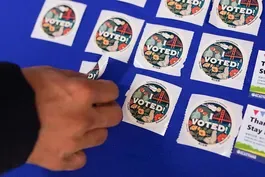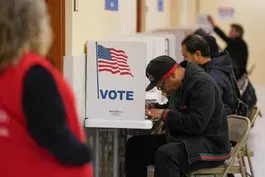
‘Burn Book' explores a life covering the tech industry
Clip: 3/5/2024 | 6m 58sVideo has Closed Captions
‘Burn Book' explores Kara Swisher’s life and complicated relationship with tech industry
Few journalists have been covering Silicon Valley as long as Kara Swisher, and even fewer are as respected, liked and feared by the tech industry and its most iconic leaders. For the first time, Swisher is opening up about her own life in her latest book entitled “Burn Book: A Tech Love Story." She joins Amna Nawaz to discuss.
Problems with Closed Captions? Closed Captioning Feedback
Problems with Closed Captions? Closed Captioning Feedback
Major corporate funding for the PBS News Hour is provided by BDO, BNSF, Consumer Cellular, American Cruise Lines, and Raymond James. Funding for the PBS NewsHour Weekend is provided by...

‘Burn Book' explores a life covering the tech industry
Clip: 3/5/2024 | 6m 58sVideo has Closed Captions
Few journalists have been covering Silicon Valley as long as Kara Swisher, and even fewer are as respected, liked and feared by the tech industry and its most iconic leaders. For the first time, Swisher is opening up about her own life in her latest book entitled “Burn Book: A Tech Love Story." She joins Amna Nawaz to discuss.
Problems with Closed Captions? Closed Captioning Feedback
How to Watch PBS News Hour
PBS News Hour is available to stream on pbs.org and the free PBS App, available on iPhone, Apple TV, Android TV, Android smartphones, Amazon Fire TV, Amazon Fire Tablet, Roku, Samsung Smart TV, and Vizio.
Providing Support for PBS.org
Learn Moreabout PBS online sponsorshipAMNA NAWAZ: Few journalists have been covering Silicon Valley as long as Kara Swisher.
And even fewer are as respected, liked, and feared by the tech industry and its most iconic leaders.
For the first time, she's opening up about her own life in her latest book, which we recently discussed, entitled "Burn Book: A Tech Love Story."
Kara Swisher, welcome back to the "NewsHour."
Thanks so much for joining us.
KARA SWISHER, Author, "Burn Book: A Tech Love Story": Thanks for having me.
AMNA NAWAZ: So I think it's fair to say that you don't mince words and you don't suffer fools.
KARA SWISHER: I don't.
AMNA NAWAZ: You call it as you see it... KARA SWISHER: That is correct.
Check.
Check.
AMNA NAWAZ: ... in particular with people in positions of power And in your memoir, it seems like you have always been that way, even when you were a kid.
KARA SWISHER: Yes.
AMNA NAWAZ: You were unafraid to question authority.
I'm wondering where that comes from, but also how you hang on to that over the years in a world that often kind of squashes that in women.
KARA SWISHER: It does.
I don't know.
I don't know what's happened here.
It just won't stop.
I was like this as a kid.
My nickname as a baby was Tempesta.
And, of course, that's the name they would put on a woman, right?
Like, oh, difficult, bossy.
I used to get bossy all the time.
And I was like, I just have executive function.
(LAUGHTER) KARA SWISHER: I don't know what to tell you.
I don't know.
I just am the way I am.
And I kind of get irked when people just tell you or explain things to you.
I'm not one that's easily mansplained at kind of thing.
AMNA NAWAZ: Yes.
KARA SWISHER: And so I just was always like, why?
Why?
Why was my favorite word.
And over the years, persistent obnoxiousness has been a career highlight for me.
AMNA NAWAZ: Well, it's a good question to be asking in journalism in particular.
KARA SWISHER: Yes.
AMNA NAWAZ: And you joined the journalism world early.
I do want to point out journalism was not your first choice for careers, right?
KARA SWISHER: No, I wanted to be in the military.
My dad was in the military who had died many years before.
And I was very -- I'm unusually -- unusually wanted to do that.
I thought it was important to serve your country.
I wanted to do military intelligence.
I was very interested in -- I thought about the CIA.
I thought about State Department, all those places.
But I was really oriented toward the military, but I was gay.
And at the time, you could not be gay and be in the military.
And it took a very long time and a ridiculous amount of - - so many good people could have served.
I would have been an admiral.
And I think I would have done a very nice job.
AMNA NAWAZ: You mentioned your father.
You were very young.
You were just 5 years old, right?
How you -- how you look back on that now, the impact of losing your father that early on who you are now, on how you live now, on how you parent now?
KARA SWISHER: Well, there's not a day that goes by I don't think about my dad.
This is some 50-some years hence.
And I think about him all the time.
He's -- he was the most important, one of the more -- when a parent dies at a young age, half your life goes away, right, like, because you have two parents, many people.
Not everybody does, but it's a real -- it's a real blow.
And I didn't realize the disaster of it, for me, at least, because what happens is, you often get very -- it's called highly functional.
And you're like, I can do it.
I'm fine.
Everything bad happened, and I'm fine.
And so you get really good at running over road -- running through roadblocks, essentially.
But when I had my first -- I have four kids now, but when I had my first -- my son, and I remember when he turned 5, which is around the age my dad died, he knew me so well.
And I was like, oh, my God, I really -- it really was someone I was very close to who died.
And you don't have memories or ability to express things as well at 5.
So it's informed everything I have done.
And it's made me realize more than most people that life is too short.
And it's that's a cliche, but I don't got any kind of time for nonsense.
That's -- I think that's what it brings to me.
AMNA NAWAZ: I was interested to learn in your academic career, when you were studying at Georgetown, your focus in history classes in particular was on Nazi propaganda.
And you wrote in your book: "What struck me was how easily people could be manipulated by fear and rage, and how facts could be destroyed without repercussions."
How much of a parallel do you see between what we are living today and what you were studying back then?
KARA SWISHER: It's the same thing.
They call it misinformation, disinformation, digital, all kinds of bots.
It's propaganda.
And so now, with -- and especially since we're addicted to these devices, it gets even worse.
So, it's -- I always say -- I say this a lot.
Like, Hitler didn't need Instagram, right, or Mussolini didn't need Snapchat.
But can you imagine if they had these devices?
Very problematic.
And they did fine with just paper or radio or whatever.
So did many other terrible leaders over the course of history.
But this presents tools to people who are bad on a global level in a scale that is unprecedented.
AMNA NAWAZ: In your career, you have covered, gotten to know interview is some of the world's most powerful tech leaders, mostly men, I think it's fair to say.
KARA SWISHER: Mostly.
AMNA NAWAZ: I'm curious, over time, if you have found that they all have one thing in common.
Is there something that stood out to you?
KARA SWISHER: Besides being straight white men?
(LAUGHTER) KARA SWISHER: Let's see.
They have different versions of this, but persistence, the ability to persist despite mistakes, right, to be able to pivot very quickly, to be able to sort of believe the unbelievable, in that -- that's a good part, but it can also be a bad part, right?
You -- if you -- you are like, I'm going to do it anyway.
But they -- the really good ones, they have that ability to keep going no matter what and believe the unbelievable, but then pivot when they need to.
AMNA NAWAZ: Your book is, as you say, a tech love story.
And I think tech has undoubtedly made our lives better in so many ways.
(CROSSTALK) AMNA NAWAZ: But there are so many risks and dangers.
And those are real.
And I wonder what you make of the efforts to try to control those, lawmakers, in particular, trying to regulate them, pressure on tech leaders to have moral or morality infused in their decisions.
I mean, how do we get rid of the risks and dangers and still have the benefits?
KARA SWISHER: Well, we haven't tried, because it hasn't worked.
We haven't done anything.
So, I mean, if there was one law, if you could name a law for me that protects us against technology specifically, I -- you can't find it.
The law that exists actually benefits them, Section 230.
It gives them broad immunity.
They can't be sued.
You can't have the biggest industry in the world, in terms of value and power, not have any liability.
It would be unimaginable if it was pharmaceuticals or insurance or Wall Street.
But here we are.
AMNA NAWAZ: You quote the line in your book, "Babylon was," meaning every major power at some point will meet its end.
KARA SWISHER: Always.
AMNA NAWAZ: Do you think the same is going to happen to the giants in tech?
KARA SWISHER: One of the things about tech is, the young tends to eat its old, although, in this new shift to AGI, artificial general intelligence, it's dominated by big companies and companies that have been around, whether it's Microsoft or Meta or Amazon.
It's -- and, of course, Alphabet, Google.
So, it's still dominated by the big players because it's so costly.
The cost of compute here is so high.
And so, right now, it's kind of an interesting shift.
The younger companies, of which they're getting funded, a ton of them, none of them has broken through to beat the bigger companies.
And I doubt they will in this particular era.
AMNA NAWAZ: All right, the book is "Burn Book: A Tech Love Story."
The author is Kara Swisher.
Kara, thank you so much.
Great to talk to you.
KARA SWISHER: Thank you.
Austin theater company preserves Latin American culture
Video has Closed Captions
Austin theater company works to preserve Latin American culture (2m 55s)
California voters decide consequential U.S. Senate race
Video has Closed Captions
California voters decide consequential U.S. Senate race (6m 32s)
Family members of hostages give opposing views on Gaza war
Video has Closed Captions
Family members of hostages offer opposing perspectives on war in Gaza (9m 55s)
How Super Tuesday may impact the 2024 presidential race
Video has Closed Captions
How Super Tuesday may impact the 2024 presidential race (8m 42s)
What's behind the stunning rise in alcohol-related deaths
Video has Closed Captions
What's behind the stunning rise in alcohol-related deaths (5m 51s)
Providing Support for PBS.org
Learn Moreabout PBS online sponsorshipSupport for PBS provided by:
Major corporate funding for the PBS News Hour is provided by BDO, BNSF, Consumer Cellular, American Cruise Lines, and Raymond James. Funding for the PBS NewsHour Weekend is provided by...
















